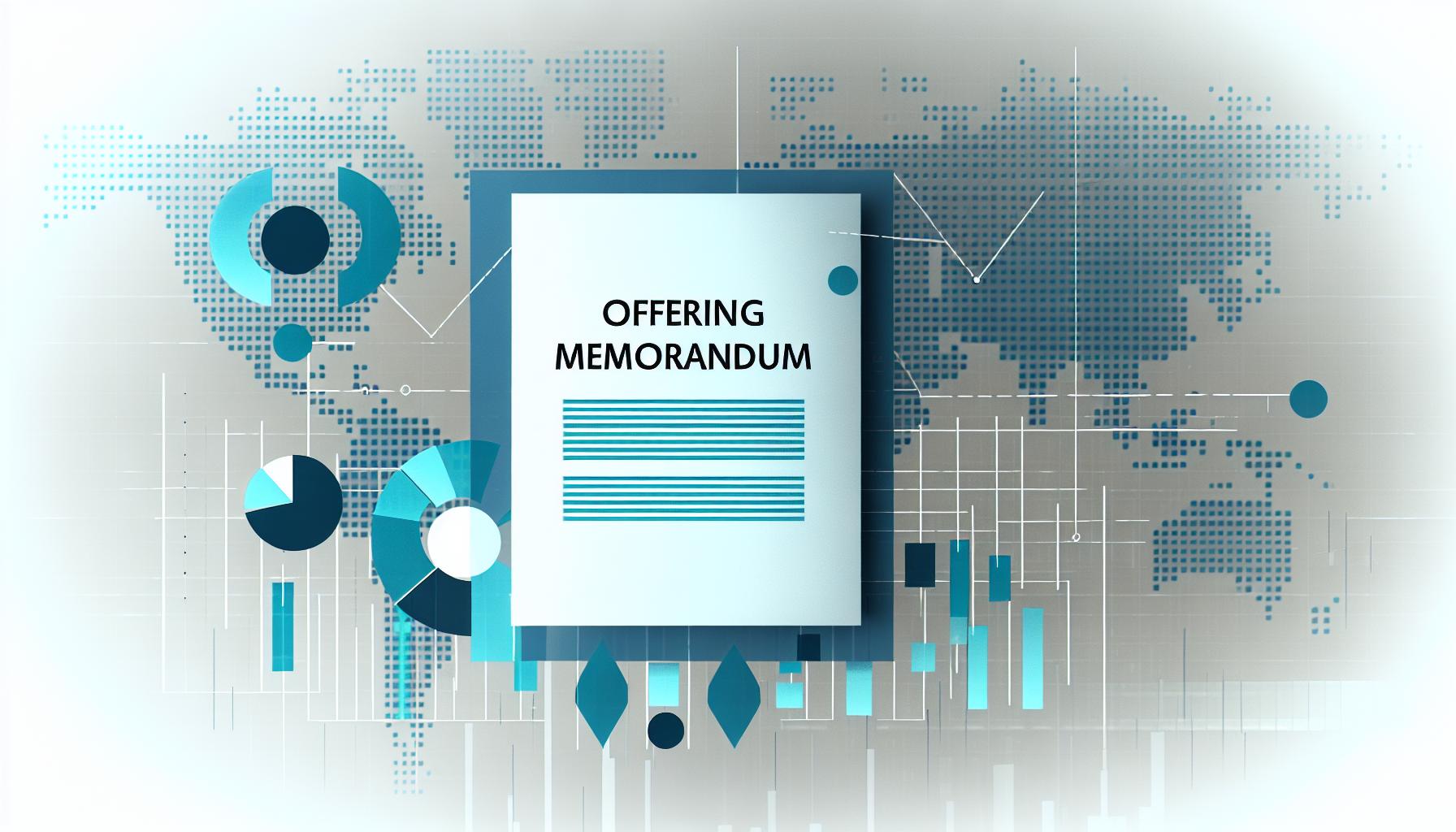What exactly is an Offering Memorandum and What role does it play in M&A?

What Is an Offering Memorandum?
An Offering Memorandum (“OM”) or Confidential Information Memorandum (“CIM”) is a document that informs interested parties about the details of an investment opportunity, like a private placement of securities or a sale of a company. The OM serves as a comprehensive disclosure document that outlines the pertinent information related to the investment. An Offering memorandum is essential for providing potential investors with the information they need to make informed investment decisions and for ensuring compliance with securities regulations. The content of an offering memorandum may vary depending on whether it is written to attract investors for a private placement or potential buyers for a company.
Potential buyers should find that the OM outlines all of the basic information about the seller’s company, especially the unique selling points. It usually includes items such as a company's financial statements, management biographies, a detailed description of the business operations, and more. It is drafted by an M&A advisory firm or investment banker on behalf of the business owners and used in a sell-side engagement to market a business to prospective buyers.
Purpose of the Offering Memorandum in M&A
The Offering Memorandum serves to provide prospective buyers with information regarding the company for sale, enabling them to evaluate the investment opportunity and determine whether they wish to pursue the acquisition. An M&A firm is responsible for finding and reaching out to potential buyers for a company that is up for sale. During the initial contact, the M&A firm only provides limited information about the company to avoid disseminating confidential information. If the buyer expresses interest in learning more about the company, the M&A advisor will share the OM only after the buyer signs an NDA (non-disclosure agreement).
The Offering Memorandum is the best way to share essential information about the company for sale with buyers. The OM is designed to tell a story about the business and the narrative must be carefully tailored to pique the interest of the audience. The OM should present the company to potential buyers accurately, professionally, and positively. The M&A advisor will create an OM that highlights the company's strengths and provides necessary information for potential buyers to evaluate the business. When reading the OM, investors should gain a clear understanding of the company's operations, offerings, and investment potential.
The Offering Memorandum is one of the crucial documents during M&A process that helps sellers showcase their attractive aspects and set the stage for maximizing their value during negotiations. It also plays an essential role in streamlining the sales process by organizing and gathering key information that the buyer may request during the due diligence process later. A well-crafted Offering Memorandum can effectively communicate the seller’s strengths and highlight its potential, ultimately increasing its chances of a successful sale.
The Offering Memorandum also presents a professional touch to the seller. Businesses that appear disorganized or unprofessional in their field of operation may struggle to secure investor commitment. The act of presenting a memorandum demonstrates a level of seriousness and professionalism within the business.
Content of the Offering Memorandum
A quality Offering Memorandum will give insight into the business and share basic information such as the company’s location, ownership, customers, employees, financials, etc. The content is important for potential investors as it provides valuable insights into the company and highlights opportunities for growth and increased profitability. Buyers rely on the content to make informed decisions about investing in a company and its potential for success.
The offering memorandum will contain detailed information about the company’s unique value proposition, informing buyers of how it could be a good investment. It will provide an in-depth analysis of the company’s history, performance, and financial projections. Additionally, the OM will describe the rationale behind the sale of the company so buyers can understand why the seller would want to exit. This document is extremely important as it allows sellers to generate interest in buyers, helping them understand the company's potential.
Offering Memorandums need to be highly detailed to share critical information with buyers, but they must not be weighed down with too many technological details. Buyers do not want to be bothered with reading a large document that is filled with unessential technical information. To keep the interest of potential buyers, the OM needs to be succinct and address their various concerns.
The following list are items usually included in an offering memorandum:
- Confidentiality Disclosure
- Financial Advisor Information
- Guidelines for Purchasers
- Executive Summary
- Rationale for Sale
- Investment Considerations
- Company Details and Operations
- Photos
- Market Analysis
- Organization Chart
- Employee Information
- Financial Statements and Analysis
Safeguarding Confidential Information
Ensuring confidentiality during M&A is crucial as news of a potential sale can be harmful to the business. Once the offering memorandum is completed and the M&A advisor has reviewed it with the seller it is ready to be shared with the M&A firm’s exclusive list of business buyers. Although buyers will execute a Non-Disclosure Agreement (“NDA”) to receive the offering memorandum, it is important not to give out confidential information that could be used by competitors. Highly confidential information should only be shared with the buyer during due diligence after an LOI is executed and should not be included in the Offering Memorandum. It is important to have potential buyers sign a Non-Disclosure Agreement before they receive the Offering Memorandum as it helps to protect the seller because the buyer is agreeing to keep the information, they receive about the company confidential. The Offering Memorandum should include a copyright notice and a note stating that the reader is subject to the terms and conditions of the NDA.
Balancing Positive and Negative Aspects
It is important to highlight the aspects of the company to interest buyers. However, it is just as important not to leave out negative aspects of the company because the information in the offering memorandum should be accurate and truthful. All information in the OM needs to be accurate and verifiable because it is unethical to knowingly make misrepresentations about the company to buyers. Furthermore, buyers will lose interest if they discover hidden problems further down the line. Being transparent and including both the good and the bad in the OM will demonstrate that the seller is trustworthy and communicates to the buyer that there will not be any surprises later on.
Engaging M&A Advisors
The Offering Memorandum should be prepared by a well-experienced M&A advisor. A professional and experienced M&A advisory team will have expertise in structuring deals, negotiating terms, and understanding market dynamics. They are skilled at crafting compelling Offering Memorandums that highlight the unique selling points of a business while also addressing potential buyer concerns in a balanced manner. By engaging an M&A advisor, the seller can ensure that the Offering Memorandum conveys all the information a buyer will need to make an appealing offer. Additionally, M&A advisors have an extensive network of potential buyers and can target the right buyers for the particular company. Their involvement ensures that the selling process is managed professionally and efficiently, leading to a better valuation and smoother transaction execution. Overall, M&A advisors are invaluable in navigating the complexities of selling a business, making their engagement a crucial element in achieving a successful sale.
Conclusion
The Offering Memorandum plays a pivotal role, serving as a linchpin that not only introduces the company for sale to potential buyers but also strategically positions it for optimal valuation and interest. This document, crafted with care by seasoned M&A advisors, transcends being merely informative; it is a narrative that encapsulates the essence, potential, and vision of the business, designed to resonate with and captivate potential investors.
Written by Xueying (Gil) He
03 April 2024
Versailles Group is a 37-year-old boutique investment bank that specializes in international mergers, acquisitions, and divestitures. Versailles Group’s skill, flexibility, and experience have enabled it to successfully close M&A transactions for companies with revenues greater than US$2 million. Versailles Group has closed transactions in all economic environments, literally around the world.
Versailles Group provides clients with both buy-side and sell-side M&A services and has been completing cross-border transactions since its founding in 1987.
More information on Versailles Group, Ltd. can be found at www.versaillesgroup.com.
For additional information, please contact
Founder and President - Versailles Group, Ltd.
+617-449-3325







